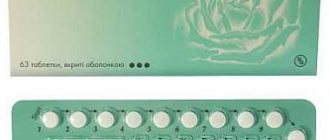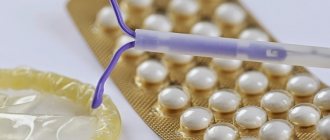Is it possible to get pregnant after taking birth control pills?
To understand the likelihood of pregnancy after stopping birth control pills, you need to understand their mechanism of action. These drugs consist of synthetic derivatives of female sex hormones - estrogens and progesterones. Due to this, the production of one’s own hormones is inhibited, which prevents the maturation of the follicle in the ovary and the release of the egg.
After discontinuation of these drugs, hormonal levels quickly return to normal and reproductive function is restored. However, this does not always happen. Fertility often returns over time, as the body needs to adapt to stopping the supply of the hormone from the outside and begin to produce its own.
It occasionally happens that pregnancy does not occur at all after hormonal contraception. The possibility of resumption of pregnancy, as well as the recovery time, is influenced by several factors:
- girl's age;
- how long have you been taking birth control?
- individual characteristics of hormonal regulation.
Will taking pills affect the child?
It has been established that hormonal drugs taken for contraception are well excreted from the body and do not disrupt the course of the pregnancy. Even if it occurs during the next course of treatment, the pills are canceled, but interruption of pregnancy is not required. There was no difference in the condition of children who were born when contraceptives were discontinued and all other newborns.
All risks and complications for a woman are the same as any pregnancy. If you have previously undergone examination and treatment of diseases that adversely affect pregnancy, then the prognosis is even improved compared to spontaneous conception.
How long after birth control pills can you get pregnant?
As noted above, the period after which you can conceive a child depends on a number of reasons. If we talk about age, the younger the girl, the sooner pregnancy can develop after taking birth control pills. A 25-year-old girl's fertility resumes, as a rule, in the second or third month after they are discontinued. A 30-year-old woman will have to wait about a year, a 35-year-old woman will have to wait 2 to 3 years.
Individual characteristics of the production of sex hormones in the body play a large role. Even if two women of the same age took the same drug for a certain time, the first may become pregnant after a couple of months, the second after a few years.
Important! If pregnancy does not occur for a long time after stopping contraceptives, you should consult a gynecologist - this may be a symptom of a concomitant pathology.
Is it possible to get pregnant immediately after stopping birth control?
The instructions for contraceptives indicate that it is possible to conceive a child in the next ovulatory cycle after stopping the drug. That is, in about two weeks. Indeed, if a girl does not have diseases of the reproductive system or concomitant pathologies of other organs, she took modern contraceptives, strictly following the instructions, pregnancy comes quickly.
Pregnancy after long-term use of birth control pills
The duration of contraceptive use is a significant factor influencing the timing of restoration of fertility. With short-term use, in most cases pregnancy occurs almost within the next cycle. But conception after prolonged use of birth control pills is possible after about a year and a half. Although we should not forget about the individual characteristics of the body.
The body's recovery process
If you decide that the time to conceive has come, you should stop taking oral contraceptives only at the end of the cycle, after drinking the last pill from the package. How long before you can get pregnant after taking birth control pills and how long it will take to resume female function, the timing is purely individual.
Why pregnancy does not occur
How quickly a girl can get pregnant after taking birth control pills depends on the ability of her reproductive system to recover. During the course of taking the drug, the body relaxes, it does not need to strain and produce its hormones, since it receives them from the outside in sufficient quantities. The ovary seems to fall asleep, the follicles do not ripen, and if one appears that lasts through the first phase, it will not burst due to the action of the medicine.
While taking birth control pills, sperm do not penetrate the uterus and pregnancy does not occur.
How to get pregnant quickly after taking birth control pills
When a course of contraception is stopped, the ovaries begin their function from the beginning of the cycle. Several rhythmic periods can pass by inertia without the release of an egg, and sometimes ovulation is observed in the first cycle.
The normalization of the menstrual cycle will show you how quickly you can get pregnant after taking birth control pills. Typically, after withdrawal, 2 irregular cycles are observed. If the cyclic process fluctuates within 6 months, you need to undergo an examination and identify the causes of the deviation.
When asked how to quickly get pregnant after taking birth control pills, doctors answer that more than two months should pass after discontinuation, after this period you can begin to conceive.
Planning a pregnancy after taking birth control pills
In order for pregnancy to go without complications and a healthy baby to be born, you should adhere to several rules for planning it:
- Start trying at least a month after stopping contraception.
- Complete the course of pills according to the instructions, since if they are discontinued incorrectly, the condition of the mother’s body suffers significantly.
- Start trying only after the menstrual cycle has completely returned.
- When starting to plan a pregnancy, take vitamins (groups B, C, E), minerals and folic acid, since hormonal contraceptives cause a lack of these substances in the body.
Attention! Folic acid is necessary for the formation of the fetal neural tube, so its deficiency leads to severe developmental defects.
When you start trying to conceive a child, you should undergo a medical examination, which includes the following methods:
- ultrasound examination of the uterus and its appendages;
- a smear from the cervix to exclude an inflammatory process;
- gynecological examination;
- study on TORCH infections - a group of infectious diseases that have a negative effect on the development of the fetus.
Carefully following all of the above rules significantly increases the chance of a successful pregnancy.
Effects of oral contraceptives on fertilization and the fetus
The effect of oral contraception on the health of the unborn child has long been the subject of debate among scientists. Thus, a study was conducted in Norway to find out how progesterone tablets affect the baby’s respiratory system and immunity. Scientists have concluded that maternal intake of progestins increases the risk of bronchial asthma in the unborn child. But over time, these data were refuted, citing insufficient evidence.
At the present stage, scientists deny the negative impact of oral contraceptives on the growth and development of the unborn child. However, research continues to this day.
When can you get pregnant after taking birth control pills?
Doctors recommend starting to try to get pregnant at least a month after the girl has completely stopped taking birth control. This is due to the fact that time must pass for normal ovulation to be restored. Also, the mucous membrane of the inner layer of the uterus needs some time to prepare for implantation (attachment) of the fertilized egg.
After prolonged use of contraceptives (more than six months), it is better to wait another three months. After all, as noted above, long-term use of contraceptives leads to a deficiency of folic acid and vitamins. Therefore, this deficit should be eliminated within three months.
When can you conceive after taking hormonal pills?
To choose the best time for conception, an examination by a gynecologist, tests and ultrasound are necessary. Usually, the doctor advises using a barrier method (suppositories, vaginal pills, condoms) for at least 1 month during a short course and 3-5 after long-term use of hormones. During this time, the inner layer of the uterus should be restored and important biologically active compounds accumulate, which will be needed for a favorable pregnancy.
Women who have been taking pills continuously for more than a year should take vitamins containing folic acid. It will help avoid fetal developmental abnormalities. The absorption of this substance is reduced during hormonal therapy.
How to get pregnant after taking birth control pills
To quickly restore fertility, proper pregnancy planning is sometimes not enough. You should also pay attention to how to take birth control pills correctly in order to get pregnant. There are factors that interfere with the fertilization of the egg, even if the girl did everything correctly. More on this later in the article.
How much to take birth control to get pregnant during withdrawal
Pregnancy while stopping birth control is indeed possible. Doctors even identify a separate term called “rebound effect.” Its essence lies in a sharp increase in ovarian function after the abolition of contraceptives. They thus compensate for their “inactivity” during the intake of hormones from the outside. This effect significantly increases the chance of rapid fertilization, and even increases the likelihood of having twins.
But the “rebound effect” is possible only with short-term use of contraceptives (maximum 3 months), and also provided that the woman is in complete health.
Why pregnancy may not occur
There are many reasons why pregnancy does not occur after stopping birth control. But these problems are rarely directly related to taking the pills. Pathologies of both the female and male body can lead to infertility. The main ones are listed below:
- violation of the quality or quantity of sperm is the main cause of male infertility;
- changes in the level of hormones, not only sex hormones, but also thyroid and adrenal hormones;
- infectious inflammatory diseases of the reproductive system;
- the presence of antibodies to the sperm of a sexual partner in a woman is an immunological conflict;
- genetic reasons.
Taking hormones does not directly cause the development of the pathologies listed above, but can intensify their manifestation.
Important! Determination of the cause and treatment of infertility should be carried out comprehensively by several specialists: an obstetrician-gynecologist, an immunologist, an endocrinologist.
Problems that may arise
Although conception itself has occurred, the body itself does not have time to normalize its own hormonal production in the first cycle after withdrawal. Therefore, the following unfavorable changes are likely:
- cycle disruption - it is shorter or longer than usual, and menstruation is scanty;
- there are no periods for several months, but the test shows no pregnancy;
- long-term use (from 3 years) changed the composition of the blood and its clotting ability, fat and carbohydrate metabolism.
Therefore, the best option for stopping the pills is to visit a doctor 3 months before the planned pregnancy..
After the examination, the gynecologist will give recommendations on how to restore hormonal levels. This is especially important if a woman has been using contraception for a long time.
If all attempts after treatment are unsuccessful, then it is necessary to exclude the most common causes:
- the man has few sperm or their motility is weak, sperm volume is reduced;
- a woman is incompatible with a man at the immunological level (antibodies are formed against sperm proteins);
- there is a hormonal imbalance in both future parents - diseases of the adrenal glands, pituitary gland, thyroid gland, diabetes mellitus;
- there is a focus (or several) of a chronic infectious process;
- genetic diseases.
How does pregnancy proceed after birth control?
If a woman takes birth control pills for several months to become pregnant, pregnancy will continue without complications. And even after taking contraceptives for a long time, if you wait a few months, there should be no negative consequences.
One of the features of pregnancy is the presence of a “rebound effect”, which was mentioned earlier. Otherwise, provided that the woman adhered to the rules for taking pills and stopping them, and also underwent all the necessary examinations when planning a pregnancy, bearing a child is no different from the pregnancy of girls who did not use oral contraception.
Admission rules for pregnancy
If a contraceptive is needed in order for the desired child to appear, then it is important to take into account the recommendations for its use:
- undergo diagnostics before starting the course - visit a therapist, take basic tests, and if necessary, need a full examination by an endocrinologist, gynecologist, geneticist (if there have been cases of hereditary diseases in the family);
- the choice of drug and duration of administration are solely within the competence of the doctor;
- fully follow the rules of administration specified in the instructions and the advice of the gynecologist;
- if a pill is missed at the beginning of the cycle, there is vomiting or diarrhea, then additional means of protection are needed for 7 days, since pregnancy against the background of hormones is undesirable;
- If you need to take other drugs with a contraceptive, consult a gynecologist about their compatibility; do not combine tablets with dietary supplements or herbs on your own.
Features of some funds
"Gynepristone"
"Ginepristone" belongs to the category of hormonal drugs that effectively prevent unwanted pregnancy if the drug is taken within the prescribed period (within the first 72 hours after sexual intercourse).
In other words, Gynepriston is an emergency contraceptive. In order for a child to be conceived in a woman’s body, the body produces a certain hormone – progesterone. Most emergency contraceptives suppress the action of this hormone, which can negatively affect a woman's menstrual cycle.
“Gynepristone” acts differently: the components block the connection between hormones and receptors, which allows conception to not occur. Therefore, the drug is classified as a mild contraceptive without negative consequences.
The action of Ginepristone occurs immediately: in the first two hours maximum effectiveness is achieved, which lasts for twelve hours. After 72 hours, the drug is completely neutralized and eliminated from the body .
"Jess", unlike "Ginepristone", is a monophasic oral contraceptive drug with antiandrogenic properties.
"Jess" - birth control pills.
Their main focus is hormonal contraception. However, it is also used as a medicine for non-essential purposes :
- To regulate the female cycle.
- To get rid of negative symptoms of PMS.
- To shorten menstrual days.
- To reduce blood loss.
- How to help get rid of acne and blackheads.
- To eliminate swelling and for weight control.
If pregnancy is planned while taking Jess, you can stop taking the pills at any time. According to doctors, the drug is an effective drug and hormonal contraceptive, which does not cause side effects even with prolonged use.
Therefore, when using “Jess” you don’t have to be afraid; pregnancy will occur almost immediately after discontinuation . At the same time, the pills can help get rid of acne, PMS pain and other unpleasant symptoms.
"Visanne"
"Visanne" is a medicine that is widely used in obstetric and gynecological practice. The main component of the drug is dienogest. "Visanne" has pronounced gestagenic properties that suppress the action of female sex hormones, estrogens.
What hormone medications are best to take for conception?
Unfortunately, not all women consult a gynecologist. The consequences of taking the wrong pills can be disastrous . Failure to follow important rules can lead to health problems. One of these is a mandatory break in taking contraceptives after 3-6 months of use. Otherwise, there is a high risk of addiction to hormonal drugs, which can lead to ectopic pregnancy or infertility.
So before purchasing any drug, you should consult your gynecologist. It is necessary to take into account the woman’s age, frequency of sexual intercourse, general condition of the body and the number of contact partners.
Experts identify a number of drugs without side effects for young women - these are microdosed contraceptives with the lowest hormone content. Drugs with the lowest hormone content include :
If drugs with small doses of hormones do not help, then low-dose drugs should be used, such as:
How to get pregnant quickly, what hormonal pills to take?
As we found out, there are many drugs that stimulate pregnancy during withdrawal. However, after discontinuation of hormonal drugs, it is still necessary to maintain a pause of three to four months before conception . Do not rush, as you can harm your health.
Even if a woman has some problems with women’s health, including infertility, taking these contraceptives will also help eliminate them and see the two coveted stripes fairly quickly after discontinuation.
Let us remind you that any hormonal drug should be selected by a specialist only based on the results of a special blood test for the hormones it contains. If an oral contraceptive is chosen correctly, its action will not only be as effective as possible, but will also, of course, contribute to the normalization of the reproductive organs, and therefore the appearance of a baby in your family.
source











